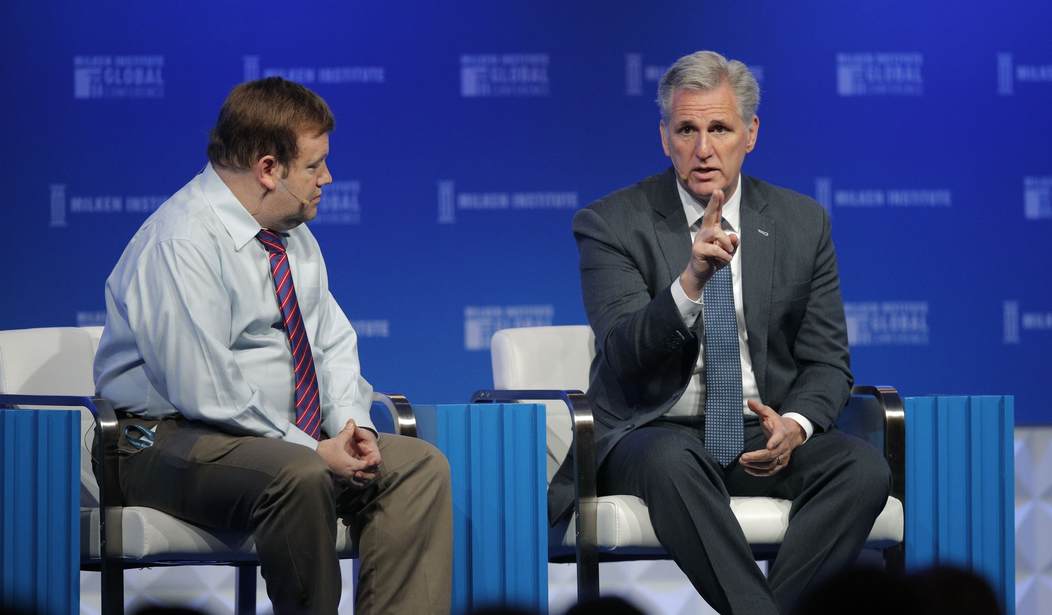Perhaps Frank Luntz is just another victim of Trump Derangement Syndrome. Since the 2016 election, it seems he is far more interested in tut-tutting the Republican base than he is in finding out what we think. The GOP should have been over him in December of 2020 when he poll-tested words to get Americans to comply with lockdowns and masks. His study, in conjunction with the Beaumont Foundation, found that Republicans were particularly skeptical of these COVID-19 mitigation strategies.
Luntz came up with some ridiculous suggestions:
Survey respondents had a much more positive reaction to the term “stay-at-home order.” “Calling it a lockdown brings to mind jailing your population,” Luntz said.
Because giving Americans an “order” sounds so much less authoritarian? This one is also precious:
Health experts often refer to hospitalization rates, but this feels distant and impersonal to the average person, Luntz said. Instead, they should focus mostly on talking about deaths, since that’s universally understood.
Because every corporate media outlet didn’t have a ticker rolling real-time death counts? Most conservatives wanted information so they could make decisions and take personal responsibility (which Luntz also suggested talking about and got completely wrong). We wanted to know precisely who is at risk for severe illness and death from COVID-19. Instead, we got rolling counters of positive tests and deaths of people who may have died “with” or “of” COVID-19, thanks to mandatory testing of hospitalized patients.
Here is Luntz’s latest regretful tweet about Republicans. Can’t you just hear the heavy sigh?
Do you have a “great deal” or “a lot” of confidence in science?
𝟭𝟵𝟳𝟱
• Democrats: 𝟲𝟳%
• Republicans: 𝟳𝟮%𝟮𝟬𝟮𝟭
• Democrats: 𝟳𝟵%
• Republicans: 𝟰𝟱% https://t.co/fqeDs9UqzX— Frank Luntz (@FrankLuntz) July 16, 2021
One small problem, Frank. That poll is a Gallup poll on institutional trust. It asks how people feel about agencies such as the CDC and NIH, Big Pharma, and research institutions — not “science” itself. A basic way to define what this question is asking is the way you feel when Dr. Anthony Fauci is on television and says, “I am science.” Another is how impressed you were by his appeals to authority in his recent exchange with Senator Rand Paul in contrast to Paul’s specific and well-supported questions that Fauci never answered.
Related: [WATCH] Rand Paul Goes Off on Fauci Over ‘Gain-of-Function’ Research
Republicans and others who object to being force-fed recommendations and “orders” by our institutions see science as a process. You know, that thing we learned in elementary school called the scientific method. As MIT researchers noted when studying mask skeptics on social media (emphasis added):
- “For these anti-mask users, their approach to the pandemic is grounded in more scientific rigor, not less.”
- “In fact, the explicit motivation for many of these followers is to find information so that they can make the best decisions for their families—and by extension, for the communities around them.”
- “While these groups highly value scientific expertise, they also see collective analysis of data as a way to bring communities together within a time of crisis, and being able to transparently and dispassionately analyze the data is crucial for democratic governance.”
- “In other words, anti-maskers value unmediated access to information and privilege personal research and direct reading over ‘expert’ interpretations.”
- “Arguing anti-maskers need more scientific literacy is to characterize their approach as uninformed & inexplicably extreme. This study shows the opposite: they are deeply invested in forms of critique & knowledge production they recognize as markers of scientific expertise.”
These personal characteristics are why censorship of dissenting views is beyond the pale for many of us. Watching the censorship and personal attacks leveled at some public health and medical experts—who were well respected and, in some cases, world-renowned before the pandemic—was horrific. Now many of them are accused of spreading “misinformation.” Dissent has become a dangerous thing and it only increases the desire of those who believe in scientific inquiry to hear them.
This was a global pandemic, which made many of us keenly interested in learning what was happening in other countries. Israel, the Netherlands, and Taiwan kept copious, detailed data sets that the United States seemed incapable of producing. And why should we trust medical journals after seeing the Lancet retraction debacle and watching studies that went against the preferred narrative being retracted, denounced, or ignored? That just increased our suspicion that the “consensus” was not as broad as the CDC and NIH wanted us to believe.
So, nice try, Frank Luntz. Your tut-tutting is insulting and seems to praise Democrats who view these institutions as infallible. Money and staff from Big Pharma permeate the FDA and clinical trials run by the NIH. The NIH holds the purse strings for our research institutions. Big Pharma spends tons of advertising dollars with the corporate media channels.
It takes guts and confidence to go against the grain. That is why many Republicans and others who still believe in personal responsibility, scientific inquiry, and open debate are willing to listen to alternative voices.










Join the conversation as a VIP Member